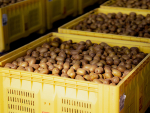More New Zealanders are taking up the chance to work in horticulture amid the COVID-19 lockdown.
That's according to Agriculture Minister Damien O’Connor.
Overseas workers traditionally fill roles in horticulture, but because of COVID-19 precautions many are not available. O’Connor says NZ Kiwifruit Growers reports some businesses now have a workforce of over 90% New Zealanders, compared to around 50% last season.
Last week alone, more than 100 staff were placed into roles in the Bay of Plenty, Auckland and Nelson. O’Connor says the pipfruit industry has seen around 200 workers from other industries placed into jobs across the country.
“It is great to see Kiwis taking up the opportunity to be part of this essential industry. Now is a peak time for picking apples and kiwifruit. Workers are in high demand and more are needed. There are jobs going all over the country in our key growing areas and the Government is working alongside the primary sector to help ensure workers get to the places they are needed.”
O’Connor says the Government is currently investigating further ways we can boost the primary sector essential workforce through its $100m redeployment scheme.
Meanwhile, he says there is no shortage of demand for NZ produce and the world needs a continuous supply of fresh fruit and vegetables.
“Our country is in the position to help do that.”
O’Connor says the primary sector is part of the solution to global food security concerns in the short-term and will play a critical role in NZ’s economic recovery after Covid-19.
He has paid tribute to the farmers, growers, meat workers, fruit pickers and all the others for helping the primary sector to keep operating as an essential service during the Covid-19 global pandemic.


















